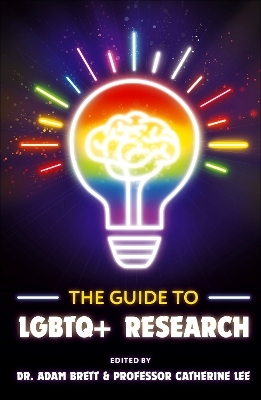
The Guide to LGBTQ+ Research
Emerald Publishing Limited (Verlag)
978-1-83549-969-6 (ISBN)
- Noch nicht erschienen (ca. Januar 2025)
- Portofrei ab CHF 40
- Auch auf Rechnung
- Artikel merken
Sharing examples of good practice from those with experience of researching the LGBTQ+ community, each section comprises of vignettes, advice, and case studies from those working in this field. Contributors include a range of experienced academics, early career researchers, research supervisors and doctoral students working in the UK and internationally. Together their vast and diverse voices combine to create a network of support for anyone undertaking LGBTQ+ research.
The Guide to LGBTQ+ Research is an essential resource for anyone embarking on master’s or doctoral level study. Each chapter aims to build your confidence as a researcher as those with experience and expertise guide you through each stage of your studies. From drawing up your research proposal, right through to publishing from your studies and finding your first academic role, this book will be a vital source of support throughout your research with the LGBTQ+ community.
Adam Brett is a researcher and lecturer in education at the University of Derby. With 15 years of experience as a secondary teacher and leader, Adam now works in the field of teacher education, and has research interests including LGBTQ+, diversity and inclusion, and professional identity. Adam is the founder of the LGBTQ+ Research Network and the co-founder of Pride & Progress, an initiative that supports LGBTQ+ inclusion in schools and universities. For more information, visit www.prideprogress.co.uk. Catherine Lee is Professor of Inclusive Education and Leadership and Pro Vice-Chancellor and Dean in the Faculty of Arts, Humanities, Education and Social Sciences at Anglia Ruskin University in Cambridge. Catherine was awarded an MBE in 2023 for Services to Equality in Education and she has written extensively on LGBTQ+ inclusion in schools and universities. Catherine’s autoethnographic research on her experiences as a lesbian teacher under the homophobic Section 28 legislation was the subject of a BAFTA nominated feature film in 2022, entitled, Blue Jean.
Introduction
Part 1: Getting Started
Chapter 1. Overcoming Imposter Syndrome; Adam Brett
Chapter 2. Prospecting for gold: Finding your guide; Lyndsay Muir
Chapter 3. Writing That LGBTQ+ Research Proposal; Kate Russell and Daniel Rogerson
Chapter 4. The importance of language; Rebecca House
Chapter 5. Writing about your own LGBTQ+ identity; Catherine Lee
Chapter 6. Social Media and Networks of Support: Unlocking the Ivory Tower and Navigating its Halls; Charlotte Feather
Part 2: Reviewing the Literature
Chapter 7. The Purpose of a Literature Review; Alex Baird
Chapter 8. Citing them Write: Crafting Inclusive Literature Reviews in LGBTQIA+ Research; Kayden Schumacher
Chapter 9. Getting to grips with the main queer theorists; Liam Cini O’Dwyer
Chapter 10. The Joy of Foucault: How his theoretical concepts can awaken the researcher-activist within; Ben Johnson
Chapter 11. Getting to grips with Judith Butler: Exploring Gender Performativity; Catherine Lee
Part 3: Positionality: Navigating subjective identities and perspectives
Chapter 12. When research becomes personal: Infusing intersectional identities into your research; Bharat Bharat
Chapter 13. Insider, Outsider: Participating Observer on a LGBTQ+ Leadership Development Programme; Alex Baird
Chapter 14. Am I an Activist?; Frankie Frangeskou
Chapter 15. Outsider positionality: Blurring the boundaries; Julie Wharton and Rhiannon Love
Chapter 16. Navigating Insider/Outsider Dynamics: Reflections from Online Fieldwork with Chinese Queer Young Adults and Their Parents; Fengqiang Wang
Part 4: Ethical Research with the LGBTQ+ Community
Chapter 17. Rethinking and Reconceptualising Ethics in LGBT+ Research; Charlotte Feather
Chapter 18. Navigating the Ethics Application Process; Helen Bushell-Thornalley
Chapter 19. The ethical challenges of compulsory guardian consent for research with LGBTQ+ youth; Lois Ferguson and Kate Russell
Chapter 20. Ethical considerations when working with LGBTQ+ children and young people; Lucy Jones
Part 5: Methodology: Planning and collecting your research
Chapter 21. Navigating participant recruitment when working with, for and as part of the LGBTQ+ community; Grace Cappy and Alex Powell
Chapter 22. Getting your foot in the door when it seems to be closed: gaining access to participants in secondary schools; Mark Williams
Chapter 23. Valuing quality over quantity: Recruiting participants within research of a sensitive nature; Beth Burgess
Chapter 24. Conducting Focus Groups with LGBT+ Participants; David Murphy
Chapter 25. Participatory Action Research with LGBT+ Co-researchers; Cait Jobson
Chapter 26. The Power of Discussion: interviewing more than once; EJ-Francis Caris-Hamer
Chapter 27. Que(e)rying traditional approaches: Using creative methods in LGBT+ research; Lis Bundock
Part 6: Data, analysis, and discussion
Chapter 28. LGBTQ+ Participant Representation: Getting it right; Katie Reynolds
Chapter 29. Honouring your participants as people: representing the richness of neurodivergent and LGBT+ intersectional identities in data analysis; Helen Dring-Turner
Chapter 30. Conducting thematic analysis with LGBTQ+ data; Jennifer Zwarthoed
Chapter 31. Analysing narrative and discourse data; Stephen DiDomenico
Chapter 32. Quantitative queer data and statistical assumptions; Daniel Rogerson
Part 7: Conclusion: Making claims to knowledge and preparing for the viva
Chapter 33. Fun with Failure: when your research does not go to plan; Pippa Sterk
Chapter 34. Have I found ANYTHING? Making claims to knowledge and originality; R Harris
Chapter 35. Preparing for the viva; Kate Russell and Liz Wands-Murray
Part 8: Life after the doctorate: Getting your academic career started
Chapter 36. Publishing from your research; Adam Brett
Chapter 37. Sharing Queer knowledge in a heteronormative world: Navigating peer review in the publication process; Jessica Gagnon and Marco Reggiani
Chapter 38. Starting your career queer: Navigating your first post as an LGBT individual; Alun DeWinter
Conclusion
| Erscheint lt. Verlag | 14.1.2025 |
|---|---|
| Verlagsort | Bingley |
| Sprache | englisch |
| Maße | 129 x 198 mm |
| Themenwelt | Sozialwissenschaften ► Pädagogik ► Didaktik |
| Sozialwissenschaften ► Pädagogik ► Erwachsenenbildung | |
| Sozialwissenschaften ► Soziologie ► Gender Studies | |
| ISBN-10 | 1-83549-969-4 / 1835499694 |
| ISBN-13 | 978-1-83549-969-6 / 9781835499696 |
| Zustand | Neuware |
| Informationen gemäß Produktsicherheitsverordnung (GPSR) | |
| Haben Sie eine Frage zum Produkt? |
aus dem Bereich


